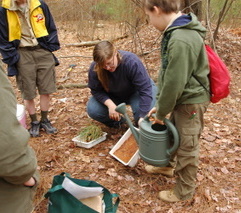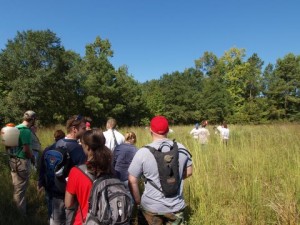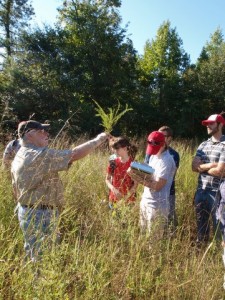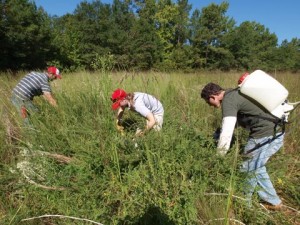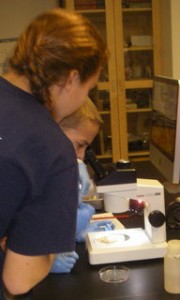
Graduate student leads Scout in hands-on exercise to earn Fisheries & Wildlife Management merit badge.
Contributors: Aletta Davis and Christi Standley
It was a cold and windy day, rain threatened on the horizon, but about 150 hardy Boy Scouts were found roaming throughout NC State University’s campus and properties, learning and working hard to earn merit badges in science-based subjects. Held March 26 this year, NCSU Merit Badge University is a one-day event hosted by several colleges and departments for local Boy Scouts.
The College of Natural Resources provided the curriculum and resources for a great group of dedicated Boy Scouts to earn their choice of five badges: Fisheries & Wildlife Management, Environmental Science, Pulp & Paper, Forestry, and Soil & Water Conservation. To offer this fabulous experience, numerous faculty, staff, and students (undergraduate and graduate) joined together to plan and lead the Scouts through a variety of requirements needed for each of these badges. For instance, fourteen NCSU faculty, staff and students, along with several Boy Scout volunteers, served as instructors and guides at Schenck Forest, the site of the Forestry and Soil & Water Conservation merit badge activities.
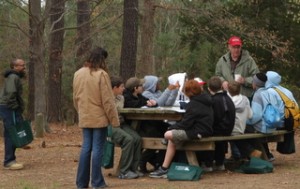
Forestry and Environmental Resources Department Head, Barry Goldfarb, gathers the Scouts before their next exercise.
Spending the day teaching the Boy Scouts about these fields of interest was rewarding for all involved, especially having the opportunity to observe intelligent, curious scouts who are full of energy and interested in learning new things. Seeing Scouts who were ‘repeat attenders’ this year is a strong indication of the success of Merit Badge University. Aletta Davis, graduate student and lab manager in the college, recalled her experience helping with this event over the past two years, saying, “I’m always amazed at the Scouts’ willingness to participate in hands-on learning exercises while working together to help each other earn these badges. I’ve learned a lot from working with the Boy Scouts and, I hope, in turn, they’ve learned a little bit about my field of interest, soils. ”
A special thanks to Tiffany McLean, CNR Director of Enrollment Management, for organizing CNR’s contribution to NCSU Merit Badge University, as she did a fabulous job of planning and organizing this event in every detailed way, even including tracking down a freezer of frozen fish stomachs!


